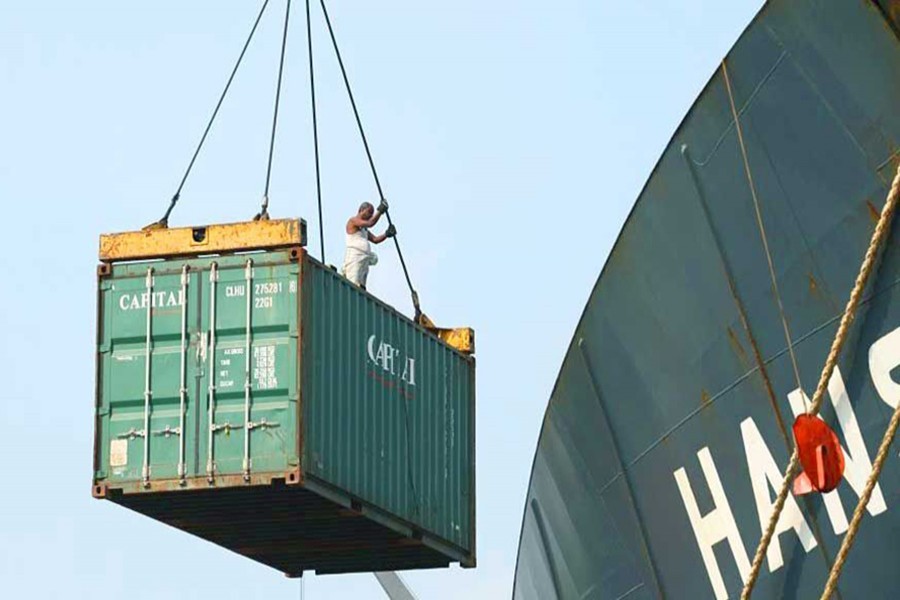Bangladesh should put forward a set of strong grounds urgently to retain its duty-free benefit for apparel exports under new GSP+ rules of the European Union (EU), suggests a study.
The time for making comment on the safeguard provisions of the new rules for 2024-2034 is set to expire by 19 November 2021, it says.
Apparel items may lose duty-free access after adoption of the new rules by EU parliament and the council likely in the last quarter of 2022.
The garment sector may see a duty hike from current zero to 12 per cent on average in EU market from 2024 under the new rule.
The study styled 'The proposed EU GSP scheme for 2024-2034: What Bangladesh must do now' was submitted to commerce ministry last month to proceed on this.
Policy Research Institute (PRI), Bangladesh research director Dr Mohammad Abdur Razzaque conducted it.
A senior official of the ministry said they would remind the EU of its pledge to continue GSP facility for LDC graduates like Bangladesh and its mention in the preamble to the new rules.
Bangladesh would request not to "hurt" these advantages by any safeguard measures, he added.
The ministry will write to the EU by Monday after the commerce minister's consent, according to the official.
Bangladesh Garment Manufacturers and Exporters Association first vice-president Syed Nazrul Islam says apparel exporters are eagerly awaiting the government's initiatives through diplomatic channel to urge the EU to consider withdrawal of the measure.
Talking to the FE, Dr Razzaque said Bangladesh might urge the EU pointing out the contradiction between preamble and a provision of the proposed GSP+ as a strong point to remove the new provisions.
Section II of the rules titled 'Safeguards in the textile, agriculture and fisheries sectors and article 29 imposed the provision in the proposed rules.
"This is clearly contradictory to the intent of the proposed new regime as in the preamble to the new proposal (paragraph 24), it is stated that product graduation should not apply to GSP+ and EBA (everything but arms) beneficiary countries but the likely exclusion under safeguards will be tantamount to product graduation," Mr Razzaque told the FE.
The new rules or legislative proposals, unveiled last September, stipulate that Bangladeshi apparel exporters do not enjoy duty-free access in the EU market.
But the country will qualify for the new rules for export of other products.
The rules reduce the threshold for apparel products' graduation from 47 per cent of the total GSP-covered imports under the current regulation to 37 per cent.
Bangladesh's current share in the GSP-covered imports in the relevant product group is almost 50 per cent.
Therefore, under the proposed policy, Bangladesh's apparel exporters will not receive any duty benefit.
"Accessing the GSP+ scheme will continue to provide duty-free market access for non-apparel items with leather goods and footwear being important items," Mr Razzaque says.
He suggests that Bangladesh strongly argue that the new GSP provisions be regarded as 'unfair' as a number of countries that were never LDCs would benefit from GSP+, including their textile and clothing exports.
His study recommends multiple key areas as strong grounds of consultation to urge the EU to allow apparel exporters to continue enjoying duty-free facility.
Sri Lanka, Pakistan and the Philippines will continue to enjoy the preferential treatment, cites the study.
Even some relatively advanced developing countries like India and Indonesia, known for export competitiveness and capacities, can access standard GSP benefits for their apparel exports to the EU, it reads.
"Bangladesh must present convincing arguments that exist in requesting the European Commission (EC) to incorporate the changes that will make the new arrangements fair and developmentally impactful."
The EU proposes that product graduation should not apply to GSP+ and EBA beneficiaries, but the likely exclusion under safeguards will be tantamount to product graduation, it asserts.
The new rules will be disadvantageous for Bangladesh as over 90 per cent of its exports to the EU will see the average tariff rate…, according to the study.
It will seriously undermine the country's medium to long-term perceived competitiveness of textile and clothing sector, affecting investment prospects.
Bangladesh's export to EU (including the UK) expanded from $2.5 billion in fiscal year (FY) 2000-01 to the highest $23 billion in FY 2018-19 before being hit by Covid-19 disruptions.
It reached $21 billion in FY 2020-21.
The EU and the UK together account for about 60 per cent of Bangladesh's merchandise exports.
More than 90 per cent of Bangladesh exports to the EU comprise textile and clothing items.
The current GSP regime of the EU will expire in 2023 and a new one will replace from the beginning of 2024.


